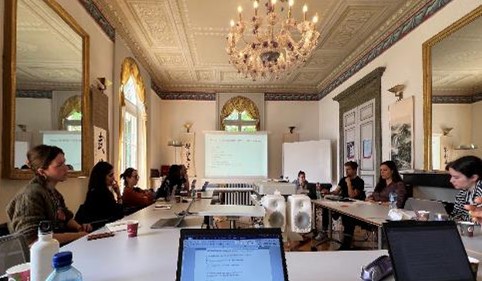From culture shock to embracing cultural diversity: My Journey at GEDT Research Hub
Feng Sun is a PhD candidate at the University of Nanjing in China working on environmental justice and ecosystem services. He spent a year as a visiting scholar within the GEDT and tells us about his journey.

Photo: Doctoral Day organized at the Confucius Institute
My first cultural shock in Geneva occurred when my landlord staunchly advocated for purchasing local products from Swiss supermarkets, despite their higher prices compared to those in French supermarkets and foreign alternatives. The reason behind this preference was rooted in the belief that supporting local products could contribute to the reduction of carbon emissions associated with transportation. As a Chinese international student accustomed to a society characterized by intense competition and rapid industrialization, I found it challenging to understand such a heightened level of environmental consciousness. During my 12-month experience at the Environmental Governance and Territorial Development (GEDT) research hub, I realized that cultural shocks resulting from diverse knowledge were ubiquitous.
Research
My doctoral research revolved around environmental justice within ecosystem services, specifically examining a national park in the process of creation. After reading Peter Larsen's papers on indigenous rights, heritage management, and environmental conflicts, I was inspired by international perspectives and interdisciplinary methods in them. I reached out to Peter Larsen via email, successfully joining his team, and this connection led to my involvement in GEDT. Since joining GEDT, Peter Larsen has underscored the importance of raising precise scientific questions and clarifying research logic, prompting me to reassess the tendency to prioritize data analysis in my previous academic work. Academic presentations in GEDT, whether on the Chornobyl heritage narrative, UN internship experiences, infrastructure in India, or environmental challenges in Indonesia's textile industry, have broadened my horizons. Moreover, Peter Larsen, Vira Orlovska, and I collaborated on a chapter of a book about natural heritage and tourism. This experience not only introduced me to a new writing paradigm but also deepened my understanding of the close connection between social sciences and natural heritage.
Working conditions
I deeply appreciate the relaxed, friendly, and cohesive atmosphere prevalent in GEDT. Notably, the punctuality observed in each meeting, consistently adhering to the agreed end time, is impressive. It is a practice uncommon in Chinese work teams where only the meeting start time is communicated, not the end time. The doctoral day activity also left a strong impression on me. During the offline exchanges, everyone shared academic experiences, life challenges, and stress-relief methods. This focus on the mental health of doctoral students created a warm atmosphere, an experience I hadn't encountered in China.
A trip to Africa
During my year at GEDT, visiting Kenya's national parks provided me with insights into the diverse approaches to national park development. In Masai Mara and Amboseli National Parks, the tourism industry emphasizes English proficiency and a strong commitment to ecological conservation. Guides allow tourists to take photos without disturbing wildlife, fostering an environment where local animals remain untroubled by human presence. Inside the parks, there's a conspicuous absence of human impact—no roads, trash bins, or tourist signs—and limited network signals maintain the natural authenticity. Plastic use is prohibited, and artificial waste is absent within the park, yet litter prevails outside, highlighting a stark contrast.

The landscape of Mount Kilimanjaro
Indigenous residents near the national park face challenges due to limited English proficiency, hindering opportunities as guides or hotel staff. Primarily relying on agriculture, only a few engage in selling tourism products or participating in performances. The communities surrounding Kenya National Park lack access to quality drinking water, necessitating tourists to rely on bottled water. My journey in Africa made me realize that protecting the integrity and authenticity of ecosystems is the purpose of national park systems. Simultaneously, Empowering local farmers, enabling them to participate in tourism development and environment protection, and thus sustainably improving their livelihoods is a key manifestation of achieving environmental justice.

Indigenous participation in tourism performances

Indigenous residents graze in national parks

Indigenous residents sell tourist souvenirs at the entrance of national parks

Soldiers patrolling the national park
Although my time in Geneva was just a year, I am profoundly thankful to Peter Larsen and GEDT for granting me this opportunity. It enabled me to recognize the beauty of cultural diversity and acquire an understanding of the world's richness. At present, I am preparing for my doctoral thesis defense in China, and in the coming year, I will commence my research journey as a teacher at Yangzhou University.
20 février 2024Carnets de recherche
